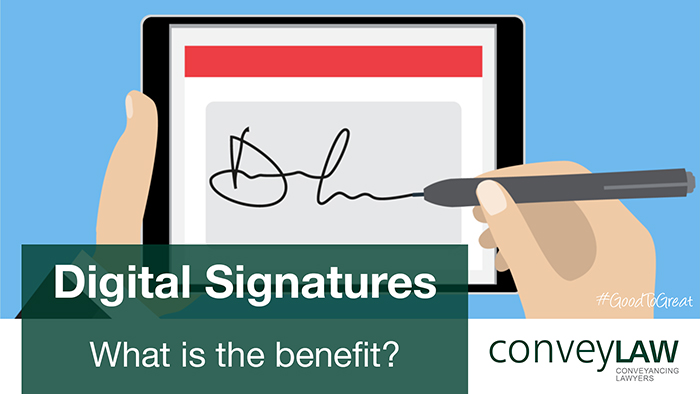Digital Signatures: What is the Benefit?

In today’s world where you can do your shopping at 6:00am in the morning, whilst sat on your sofa in your pyjamas, sipping a cup of Earl Grey and have your items delivered the same morning, consumer’s expectations are increasing all the time. This is the same in the world of conveyancing, where our clients are making the biggest financial commitments that they will ever make and it is incumbent upon us as the “comfort blanket” for our clients to make the process as easy and as stress free as possible, whilst ensuring that we continue to maintain exemplary standards in regulatory and legislative compliance.
Will the introduction of digital signatures really make a difference to a conveyancing transaction? It is an interesting point to consider as the introduction of digital signatures will not only undoubtedly expedite a conveyancing transaction – avoiding the need to rely on “snail mail” for the issue and return of signed documents, whilst negating the need for the traditional visit to the Conveyancer to sign the Contract, a luxury that many people simply do not have the time to accommodate in today’s busy society, where personal time is precious.
The use of a digital signature also allows the client to view and approve any and all alterations to a document in real time, avoiding any ambiguity on the terms agreed.
At Convey Law, we facilitated the first ever electronic exchange of contracts for a residential property transaction, utilising e-signatures at 3:59pm on the 6th April 2017. The digital signature process was facilitated via the Bonafidee e-signature system, which enabled the final form of Contract for Sale to be e-mailed to both the seller and the purchaser to sign electronically on the day of exchange of contracts, allowing the parties to review and agree the final terms before committing themselves to the Contract. The Bonafidee system is a password protected system and undertakes identification checks to confirm that the person who is accessing the document is actually the person involved in the transaction. The system provides confirmation that the document has been read and signed with an automatically generated code, personal to each party, replacing the “wet” signature.
Taking these points into consideration, it is easy to see the benefits to our clients, but does the Conveyancer really benefit from the use of digital signatures? Perhaps the biggest benefit to Conveyancers would be to use the introduction of digital signatures as an additional fraud prevention tool as you need to be 100% sure that the person executing the digital signature is your client and the person that they purport to be.
It is pleasing to see that there is appetite in this area as earlier this year the Land Registry consulted on amending rules to allow documents to be signed online by the government’s Gov.UK.Verify process, which is used in other areas where the confidentiality of documents is vital – such as the filing of HMRC self assessment returns.
With this in mind, the digital signature process is likely to develop further with electronic signatures replacing the need for Deeds. Currently Deeds need to be witnessed by another individual to verify that the person executing the Deed is the right and proper party to the Deed, subject of course to the appropriate proof of identity verification checks having been satisfactorily undertaken. At present, paper Deeds such as Transfer Deeds, Mortgage Deeds etc do not check the identity and authenticity of the individuals witnessing the execution of the Deeds and you will not be surprised to note that at the Conveyancing Association Annual General Meeting on the 3rd April 2017, a “hands up” poll of 100 Conveyancers in attendance revealed that none of the Conveyancers were actively verifying the legitimacy of the witnesses to such Deeds.
The development of an electronic signature system would limit the risk of fraudulent property transactions and negate the need for the witnessing of documents. If the Conveyancer is able to undertake all necessary identification checks to prove, beyond all doubt, that the person executing the document is, indeed, the person that they are purporting to be, there is no value in having the document witnessed by a third party.
This sounds all very exciting, but to provide real value to the digital signature process, the digital signature must be coupled with appropriate identification verification checks to ensure that the person executing the document is, indeed, the correct and proper party to the transaction. At the present time, there is no formal ruling or guidance which dictates the nature, level and extent of the verification checks, which are necessary to comply with the various regulatory and legislative requirements. We are rightly told that we must be 100% satisfied that our clients are the persons that they purport to be, but we are not told what actual verification checks are needed to satisfy this requirement and it is left to Conveyancers to set their own standards. In light of recent horror cases such as Dreamvar, non-ambiguous guidance from regulators is required to ensure that a common standard is implemented across the industry. Such guidance will undoubtedly lead the way to digital signatures becoming common place in the day to day life of conveyancing, to the benefit of Conveyancers and our clients.
Digital conveyancing/signatures is the logical next step in improving the home buying process for our clients and those Conveyancers who commit to making the process easier for their clients. Maintaining the highest standards of identification verification checks will lead directly to the electronic execution of all documentation and the welcome benefits that such changes will bring.
Gareth Richards – Legal Director of Convey Law & Society of Licensed Conveyancers Board Member
August 7, 2018